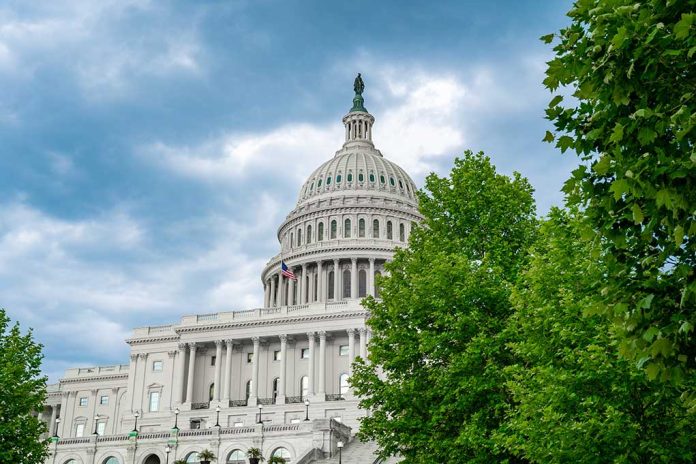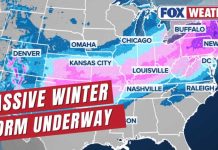
President Trump’s emergency tariff policy survived a Senate challenge in a dramatic 49-49 tie vote, showcasing deepening Republican divisions over the administration’s aggressive trade stance.
Key Takeaways
- The Senate rejected an effort to undo President Trump’s 10% tariffs with a tied vote of 49-49, with Vice President JD Vance’s procedural move ending the challenge.
- Three Republican Senators—Rand Paul, Susan Collins, and Lisa Murkowski—broke ranks to join Democrats in supporting the resolution against the tariffs.
- Key absences from Senators Mitch McConnell and Sheldon Whitehouse potentially altered the outcome of the closely contested vote.
- The resolution faced minimal chance of ultimate success as House Republican leadership blocked similar measures from reaching the floor, and any passage would have faced a presidential veto.
- Senator Rand Paul cited traditional conservative principles against taxation in his opposition to the tariffs, suggesting many Republicans privately share concerns about the policy.
Senate Narrowly Preserves Trump’s Tariff Emergency
President Trump’s “Liberation Day” tariff plan survived a significant challenge in the Senate yesterday as lawmakers split evenly on a resolution that would have terminated the national emergency declaration underpinning the trade policy. The measure, requiring a simple majority to pass, deadlocked at 49-49, effectively killing the resolution and preserving the President’s authority to maintain the 10 percent tariffs on most U.S. trading partners. The tied vote highlighted growing tensions within Republican ranks over the administration’s trade agenda, with three GOP senators publicly breaking with the President on one of his signature economic policies.
Senator Ron Wyden (D-OR) introduced the measure as a “privileged” resolution, forcing consideration despite Republican control of the chamber. The Democrats maintained unified opposition to the tariffs, picking up Republican support from Senators Rand Paul of Kentucky, Susan Collins of Maine, and Lisa Murkowski of Alaska. The dramatic outcome might have been different had Senators Mitch McConnell and Sheldon Whitehouse not been absent for the vote, potentially giving supporters the slight edge needed for passage.
US Senate narrowly rejects bipartisan measure to block Trump tariffs.
— FinancialJuice (@financialjuice) April 30, 2025
Republican Dissenters Voice Concerns
Senator Rand Paul emerged as one of the most vocal Republican critics of the tariff policy, framing his opposition in terms of traditional conservative principles. Paul’s concerns centered on the broader economic impact of tariffs as an additional tax burden on American consumers and businesses. His public break with the administration reflected what he suggested are more widespread private concerns within Republican ranks about the direction of the President’s trade agenda.
“You know, there was an old-fashioned conservative principle that believed that less taxes were better than more taxes,” said Rand Paul.
Senator Susan Collins offered more measured criticism, acknowledging the administration’s intent while questioning the broad application of the tariffs. “It’s not perfect, I think it’s too broad,” Collins noted about the emergency declaration and resulting tariff policy. Senator Tim Kaine particularly questioned the inclusion of Canada in the tariff policy, challenging the notion that trade with America’s northern neighbor constituted part of the declared emergency.
Limited Path Forward for Opposition
Despite the narrow vote in the Senate, the resolution faced significant obstacles to ultimately reversing the tariff policy. The White House had signaled President Trump would veto the measure if it reached his desk, requiring a two-thirds majority in both chambers to override. House Republican leadership had preemptively moved to block similar measures from reaching the floor, eliminating the possibility of politically difficult votes for members who might privately harbor reservations about the tariffs.
“It’s still a debate worth having,” Mr. Paul insisted, despite the resolution’s failure.
The tied vote represents a political victory for the administration, allowing President Trump to continue implementing his “Liberation Day” trade agenda without congressional interference. While the vote revealed some cracks in Republican unity on trade policy, the majority of GOP senators stood firmly behind the President, recognizing the tariffs as a cornerstone of his economic strategy. With the legislative challenge effectively defeated and the House showing little appetite for pursuing similar measures, the administration’s emergency declaration and resulting tariffs appear secure for the foreseeable future.
Sources:
- Senate Rejects Bipartisan Measure to Undo Trump’s Tariffs – The New York Times
- Vance breaks key tie after Senate fails to reject Trump’s national emergency on tariffs




